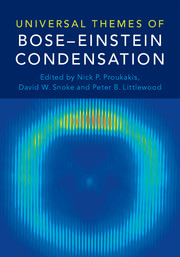Preface
Published online by Cambridge University Press: 18 May 2017
Summary
This book marks the twentieth anniversary of the publication of the book Bose- Einstein Condensation by Cambridge University Press. The book was the result of the 1993 meeting in Levico-Terme, Italy, organized by Allan Griffin, David Snoke, and Sandro Stringari, with significant help from Andre Mysyrowicz. That meeting grew out of a desire by many theorists and experimentalists to discuss the general themes of Bose-Einstein condensation, to draw connections between different physical systems.
One of the major driving forces for that meeting was the desire to have another example of Bose-Einstein condensation besides liquid helium. There was serious discussion at the time of whether nature abhorred a condensate, and liquid helium was a special, anomalous case. Experiments on spin-polarized hydrogen, excitons in semiconductors, and optically trapped atoms had been going on for more than a decade, without success. To move the field forward, the organizers of the 1993 meeting brought together world experts on the general theory, and experimentalists of all types, to discuss the universal themes of Bose-Einstein condensation generally. There were fascinating and heated debates about such topics as the time scale for condensation (could it be possible that condensation will not occur in a system with finite lifetime?), the concept of spontaneous symmetry breaking (could there ever be a universal “phase standard” for condensates?), and how superfluidity and condensation are related.
The situation is quite changed now. We now have many experimental examples of Bose-Einstein condensation, most notably atoms at very low temperature in optical traps, which led to the Nobel Prize in Physics in 2001. This work of Eric Cornell and Carl Wieman was first announced at the second general meeting on Bose-Einstein condensation in 1995, in Mt. Ste. Odile, France. This led to the successful conference series on atomic Bose-Einstein condensation, which now takes place regularly in San Feliu de Guixols, Spain.
Because of this changed situation, the present book does not have the same form as the 1995 book. At that time, it was possible to survey a good fraction of all the experimental and theoretical efforts in the field. The field is now so large that no book can do that comprehensively, and this book leaves out a good many significant topics.
- Type
- Chapter
- Information
- Universal Themes of Bose-Einstein Condensation , pp. xi - xiiPublisher: Cambridge University PressPrint publication year: 2017



